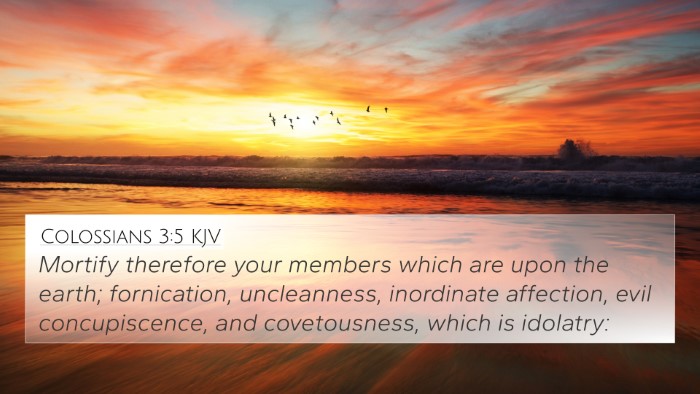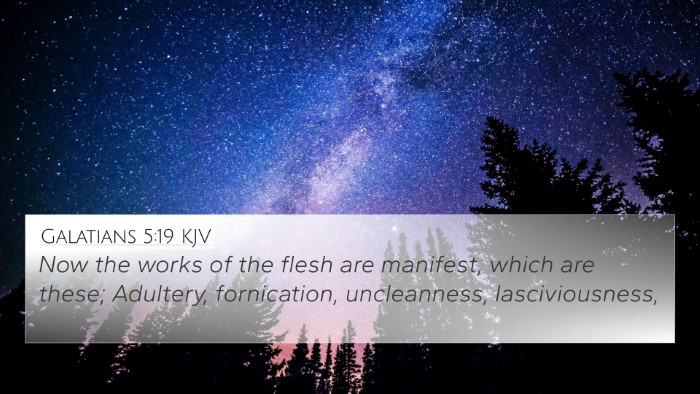Understanding Hebrews 12:16
Hebrews 12:16 states: "Lest there be any fornicator, or profane person, as Esau, who for one morsel of meat sold his birthright."
This verse serves as a powerful warning within the context of the Christian faith, emphasizing the dangers of valuing temporal pleasures over eternal blessings.
Verse Context
In this chapter, the author of Hebrews discusses the concept of enduring through trials and following the discipline of the Lord. The reference to Esau provides a vivid illustration of how one can forfeit significant blessings for immediate gratification.
Commentary Insights
Matthew Henry's Commentary:
Henry highlights the importance of holding onto one’s spiritual birthright which represents one's relationship with God and the promises associated with it. He points out that Esau’s act of selling his birthright in exchange for a single meal was a grave mistake, symbolizing the loss of something invaluable for fleeting satisfaction.
Albert Barnes' Notes:
Barnes analyzes the term “profane,” suggesting that it refers not just to immorality but also a disregard for sacred things. He sees Esau as a cautionary figure, illustrating how one can act foolishly by making poor choices when neglecting spiritual priorities.
Adam Clarke's Commentary:
Clarke elaborates on Esau's character and choices. He portrays Esau as a man who preferred the pleasures of the moment over the lasting joys of a birthright, serving as a metaphor for the believer's struggles against worldly temptations.
Cross-References
- Genesis 25:29-34: The account of Esau selling his birthright for a bowl of lentil stew provides the historical context for Hebrews 12:16.
- Malachi 1:2-3: In this passage, God expresses His love for Jacob and hatred for Esau, highlighting the divine choice in blessing and the consequences of Esau's choices.
- Romans 9:13: Echoes the sentiment of God's sovereign choice in choosing Jacob over Esau, underscoring themes present in Hebrews.
- 1 Corinthians 10:8: Warns against the sins of Israel, paralleling the idea of succumbing to temptation.
- James 4:4: Highlights enmity against God through friendship with the world, akin to Esau’s selling of his spiritual heritage.
- Philippians 3:19: Discusses those who have their minds set on earthly things, similar to Esau's focus on physical hunger.
- Matthew 16:26: Questions the worth of gaining the world at the expense of one’s soul, aligning with the consequences of Esau's actions.
- Colossians 3:2: Advises believers to set their minds on things above, contrasting Esau's focus on the temporal.
- 1 John 2:15-17: Warning against loving the world and its desires, resonating with Esau’s choices.
Thematic Connections
This verse links to many key themes in Scripture, showing the significant Bible verse parallels regarding decisions made from a place of earthly desire versus those aligned with divine purpose.
The pitfalls of immediate gratification are illustrated not just through Esau's actions but recurrently throughout the Bible.
Application for Believers
Believers are reminded of the importance of guarding their spiritual inheritance against the temptations of immediate worldly satisfaction.
Tools for Bible cross-referencing can be particularly beneficial in deepening one’s understanding of such themes, allowing for a more robust Bible cross-reference guide in one’s study.
Engaging with passages that underscore similar warnings can enhance the believer's spiritual journey and moral framework.
How to Use Bible Cross-References
When studying Hebrews 12:16, consider seeking out Bible references resources that guide you through cross-referencing themes.
The interplay of the Old and New Testaments can illuminate deeper spiritual truths. For instance, connecting Esau's story not only to the Genesis account but also to the teachings in Romans and Hebrews enriches the understanding of sacrifice and choice within the Christian faith.
Conclusion
Hebrews 12:16 serves as a profound reminder of the consequences of valuing the temporary over the eternal.
The insights extracted from public domain commentaries emphasize the necessity of understanding our spiritual heritage, encouraging believers to resist the allure of short-lived pleasures in favor of lasting spiritual rewards.
Through a comprehensive study involving comparative Bible verse analysis and thoughtful scriptural cross-referencing, individuals can cultivate a deeper appreciation and understanding of their faith journey.





















